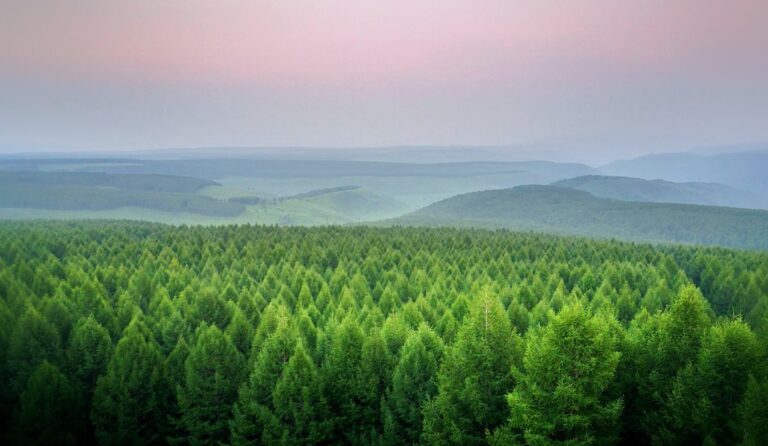Forests, defined as the area of land occupied by trees of many different species, play a crucial role in maintaining environmental stability and are often referred to as “the lungs of our planet.” They are crucial for ecological balance, wildlife habitat, and fighting climate change by soaking up excess carbon dioxide from the atmosphere.
Although deforestation is still a worldwide problem caused by human population and activity, several nations have taken bold measures to protect their tropical forests. Suitable and sustainable environmental conditions are maintained in these countries, allowing forests to thrive.
Table of Contents
The 7 countries with more forests
In this article, we will inquire into seven countries with the most forests in the world.
1. Russia
Russia has one of the world’s largest forested areas, and its territory is one of the world’s largest at around 7.7 million square kilometres. Coniferous and deciduous trees make up its forests, which are mostly located in Siberia and the Russian Far East.
The woods of Russia are the largest and densest in the world. They are well-known for their expansive acreage, which accounts for about 45.40 percent of the country’s total area and makes it the world’s largest forest.
Both their variety and their ability to store carbon make these forests invaluable.
2. Brazil
The Amazon Rainforest is located in Brazil, which has the second-largest forest area in the world, at 4,776,980 km2. It is well-known for the abundance of species found there and its huge size.
The Amazon Rainforests in Brazil cover more land than the entire country of India at 56.10 percent The Amazon rainforest comprises the larger, more biodiverse portion of the Amazon forest.
This rainforest is important because it acts as a carbon sink, taking in large amounts of carbon dioxide from the atmosphere and releasing much needed oxygen. The world’s rarest animals and vegetation can be found there.
3. Canada
Canada’s forested terrain occupies 31.06 percent of the country, making it third in the world. Coniferous trees like spruce, fir, and pine dominate Canada’s woods. Which encompass more than 3.1 million square kilometers of the country’s natural wilderness.
Given that Canada is the world’s second-largest country, its forests are around the same size as India.
Wildlife can’t survive without these woods. And the country’s timber sector can’t thrive without the steady supply of materials they provide.
4. United States
In spite of its growing population, the United States still has the world’s fourth-largest area of forest. Extending across a massive 3,000,000 square kilometers.
Even before European arrival, it was estimated that these forests encompassed millions of acres. Due to rapid urbanization and industrialisation, this formerly vast forest cover has been drastically decreased.
The forested land area in the United States is down to 30.84 percent of the country’s total acreage. California’s towering redwoods and the East Coast’s lush woodlands are only two examples of the country’s wide variety of forest types.
5. China
In terms of total forest area, China is fifth on the list, with an area of up to 1.8 million square kilometers. It is a land of boundless beauty and varied landscapes with both mountainous and plains areas, as well as extensive forested areas.
With only roughly 18.21% of its land area covered by forests, the country has the lowest forest coverage of any country in the world. All types of forest habitats, from temperate forests in the north to subtropical forests in the south, are included in its enormous region.
6. Australia
Australia is a continent in its own right, not merely a country. This means that the forest cover in holds is greater than in any other nearby country. It has the most beautiful, lush green, and diverse forests in the world. And it ranks sixth in terms of forest area.
The overall land area of the country is around 1470,832 square kilometers. With forests covering about 19 percent of this area.
7. Democratic Republic of the Congo
Central Africa’s Democratic Republic of the Congo is home to the world’s seventh-largest forest cover. It extends through the southeastern corner of Cameroon, the eastern side of Gabon, and the northern and central parts of the Republic of the Congo.
In total, the Congo’s forested areas cover around half of the country. In precise terms, its forest area is 219326 square kilometers in size.
Wild animals, such as gorillas and elephants, thrive in its tropical forests, which extend into the Congo Basin. Carbon sequestration and the protection of biodiversity both benefit greatly from these forests.
Prioritizing sustainable forest management and conservation
The survival of Earth’s ecosystems and the mitigation of the damaging consequences of global warming are both inextricably linked to the work done by the world’s forest ecosystems. The countries that have the greatest percentages of land covered in forests are extremely important players in the global conservation movement.
They may serve as a model for others to follow in the effort to preserve the world’s forests for future generations by placing an emphasis on appropriate forest management and conservation practices.
Read also: What is afforestation: planting trees on a large scale for a sustainable tomorrow












